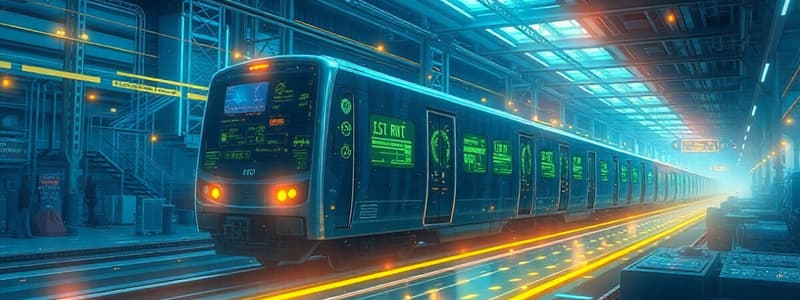Podcast
Questions and Answers
What are control systems primarily built for?
What are control systems primarily built for?
- Enhancing human emotions
- Limiting system interactions
- Power degradation
- Achieving a desired output with specified input (correct)
Which of the following is NOT one of the primary reasons for building control systems?
Which of the following is NOT one of the primary reasons for building control systems?
- Cost reduction (correct)
- Remote control
- Compensation for disturbances
- Power amplification
Which of these is identified as a significant measure of performance in control systems?
Which of these is identified as a significant measure of performance in control systems?
- Data processing speed
- Input reliability
- Transient response (correct)
- Mechanical stability
Who was responsible for publishing the stability criterion for a third-order system?
Who was responsible for publishing the stability criterion for a third-order system?
What does the term 'compensation for disturbances' refer to in control systems?
What does the term 'compensation for disturbances' refer to in control systems?
Which example does NOT qualify as a control system application?
Which example does NOT qualify as a control system application?
What type of control systems did the Greeks begin engineering around 300 B.C.?
What type of control systems did the Greeks begin engineering around 300 B.C.?
Which application of control systems was mentioned as an example linked to Philon of Byzantium?
Which application of control systems was mentioned as an example linked to Philon of Byzantium?
What technique did Walter R. Evans develop in 1948?
What technique did Walter R. Evans develop in 1948?
Which configuration of control systems is characterized by feedback?
Which configuration of control systems is characterized by feedback?
In what year did the Sperry Gyroscope Company install an automatic steering system?
In what year did the Sperry Gyroscope Company install an automatic steering system?
What does the acronym PID stand for in control systems?
What does the acronym PID stand for in control systems?
Who is attributed with much of the general theory used today to improve automatic control systems?
Who is attributed with much of the general theory used today to improve automatic control systems?
What was a major application of the techniques developed by the Sperry Gyroscope Company?
What was a major application of the techniques developed by the Sperry Gyroscope Company?
Which of the following best describes the root locus technique?
Which of the following best describes the root locus technique?
Which aspect of control systems was Henry Bessemer known for in 1874?
Which aspect of control systems was Henry Bessemer known for in 1874?
What describes an open-loop system?
What describes an open-loop system?
Which of the following is an advantage of an open-loop system?
Which of the following is an advantage of an open-loop system?
What is the main advantage of using a computer-controlled system in modern applications?
What is the main advantage of using a computer-controlled system in modern applications?
What is a disadvantage of a closed-loop system?
What is a disadvantage of a closed-loop system?
Which characteristic is associated with closed-loop systems?
Which characteristic is associated with closed-loop systems?
How does the transient response in open-loop systems compare to closed-loop systems?
How does the transient response in open-loop systems compare to closed-loop systems?
What is a typical application for open-loop systems?
What is a typical application for open-loop systems?
What better describes the analysis process in system design?
What better describes the analysis process in system design?
Who invented the safety valve, marking the beginning of steam pressure regulation?
Who invented the safety valve, marking the beginning of steam pressure regulation?
Which system did Edward John Routh contribute to by extending stability criteria?
Which system did Edward John Routh contribute to by extending stability criteria?
What invention did James Watt create to control the speed of steam engines?
What invention did James Watt create to control the speed of steam engines?
Who is noted for improving speed control in a windmill by introducing movable louvers?
Who is noted for improving speed control in a windmill by introducing movable louvers?
In which year did Alexandr Michailovich Lyapunov complete his doctoral thesis on stability?
In which year did Alexandr Michailovich Lyapunov complete his doctoral thesis on stability?
What focus did the development of control systems shift towards in the second half of the 1800s?
What focus did the development of control systems shift towards in the second half of the 1800s?
What does the Routh-Hurwitz criterion pertain to?
What does the Routh-Hurwitz criterion pertain to?
Which two researchers developed an analysis of feedback amplifiers at Bell Telephone Laboratories?
Which two researchers developed an analysis of feedback amplifiers at Bell Telephone Laboratories?
Engineering synthesis and engineering analysis are the same.
Engineering synthesis and engineering analysis are the same.
A multivariable system is defined as a system with what characteristics?
A multivariable system is defined as a system with what characteristics?
What is the primary purpose of early feedback control applications?
What is the primary purpose of early feedback control applications?
What is often the focus of control system analysis tasks?
What is often the focus of control system analysis tasks?
Adjustments of the forward path gain can impact what aspect of a control system?
Adjustments of the forward path gain can impact what aspect of a control system?
Control of an industrial process by automatic means is known as what?
Control of an industrial process by automatic means is known as what?
Safe automobiles, autonomous robots, and automated manufacturing are examples of what?
Safe automobiles, autonomous robots, and automated manufacturing are examples of what?
What is a common task in control system design?
What is a common task in control system design?
Flashcards are hidden until you start studying
Study Notes
Control Systems Overview
- A control system integrates subsystems and processes to achieve desired outputs from specified inputs.
- Examples include radar systems, satellites, elevators, buses, and smartphones.
- Key purposes for building control systems:
- Power amplification
- Remote operation in hazardous environments
- Convenience of various input forms
- Disturbance compensation
Performance Measures
- Two major performance measures:
- Transient response: how quickly the system reacts to changes
- Steady-state error: the difference between the desired and actual output after the system has settled
Historical Development of Control Systems
- Ancient Greeks designed early feedback systems, with Ktesibios inventing a water clock around 300 B.C.
- Philon of Byzantium applied liquid-level control principles to oil lamps.
- Key developments in the 19th century:
- James Clerk Maxwell published stability criteria for third-order systems in 1868.
- Edward John Routh advanced stability criteria to fifth-order systems in 1874.
- The advent of safety valves improved steam pressure regulation.
Innovations in Speed Control
- Edmund Lee implemented speed control for windmills in 1745.
- James Watt developed the flyball governor for steam engine speed regulation.
- Notable improvements included movable windmill sails introduced by William Cubitt in 1809.
20th Century Advances
- Automatic ship steering systems emerged in the early 1900s, with significant contributions from Nicholas Minorsky.
- The foundational PID (Proportional-Integral-Derivative) controller was established through Minorsky's work.
- In the 1920s and 1930s, feedback amplifier analysis evolved at Bell Telephone Laboratories, leading to sinusoidal frequency analysis.
System Configurations
- Two primary configurations of control systems:
- Open-loop systems: lack feedback for adjustment, relying solely on input commands.
- Closed-loop systems: utilize feedback to correct disturbances, enhancing response accuracy.
Advantages and Disadvantages
- Open-loop systems:
- Affordable and simple to implement and maintain.
- Cannot adjust for disturbances, potentially leading to inaccuracies.
- Closed-loop systems:
- Greater accuracy and less sensitivity to environmental changes.
- More complex and expensive, requiring careful design and implementation.
Control System Analysis and Design
- Analysis aims to determine system performance, including transient response.
- Typical tasks involve adjusting parameters to meet specifications and analyzing transient response.
- Important modern applications include safe automobiles, autonomous robots, and automated manufacturing.
Questions for Understanding
- Determine if given statements about control system analysis and design are true or false.
- Identify early applications of feedback control and modern control system applications.
- Reflect on adjustments impacting transient response and approaches for mathematical modeling of control systems.
Studying That Suits You
Use AI to generate personalized quizzes and flashcards to suit your learning preferences.




